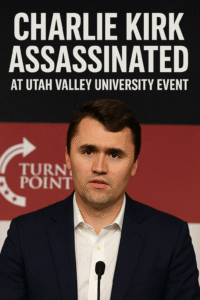Charlie Kirk Shot Dead at Utah Campus — What Happened and Why It Matters
Orem, Utah — Charlie Kirk, a high-profile conservative activist, author, and founder of Turning Point USA, was shot and killed Wednesday during a dramatic political event at Utah Valley University. The attack, described by Utah’s governor as a “political assassination,” has sparked outrage, intense scrutiny, and widespread calls for healing amid increasing concern over political violence in the United States.

The Incident
Kirk, aged 31, was on the first stop of his “American Comeback Tour,” addressing students at UVU, where he hosted a signature “Prove Me Wrong” debate table outdoors. Around 12:10 p.m. local time, about 20 minutes into the event in the campus quad, gunfire rang out. Video recordings show Kirk clutching his neck before collapsing. Attendees fled. Law enforcement says the shot came from a rooftop of a building approximately 100 to 200 yards away.
Authorities initially took two people into custody but later released them after determining neither had connections to the shooting. A person of interest is being sought; the suspect is thought to be a young male.
Aftermath and National Reactions
Kirk was transported to a nearby hospital and pronounced dead. Utah Gov. Spencer Cox called the killing “a tragic day for our nation” and “political assassination.”
President Donald Trump ordered flags across the U.S. and at overseas embassies flown at half-staff until September 14. He also released a proclamation “Honoring the Memory of Charlie Kirk,” expressing grief and tribute to Kirk’s work.
Public figures from across the political spectrum condemned the violence. Vice President J.D. Vance, Republican leaders, and even Democratic figures decried the attack. Many emphasized the need to stand against political violence.
Who Was Charlie Kirk
Charlie Kirk rose to prominence as one of the most visible figures in the conservative movement in recent years. He co-founded Turning Point USA in 2012 while still a teenager, an organization that became a major force in mobilizing young conservatives, especially on college campuses. Through speeches, frequent media appearances, books, and his podcast and radio show, he became closely allied with former President Trump and the broader MAGA movement.
His political style was often provocative: he was a strong critic of what he called “mainstream media,” opposed abortion and strict gun control, challenged ideas around gender and immigration, and was a vocal proponent of Christian conservative values. These stances won him intense loyalty—and fierce criticism.
Broader Significance
Kirk’s assassination has amplified ongoing national concerns about political polarization and threats to public discourse. Many observers point to a growing trend of violence taking place in political contexts—assassination attempts, shootings, and violent threats both online and offline.
The shooting has also raised questions about security at political events, the role of extremist ideology, and the impact of rhetoric in inflaming tensions. MSNBC analyst Matthew Dowd was fired after suggesting on air that Kirk’s rhetoric might have contributed to the violence, triggering backlash over whether public figures should be held partly responsible for the climate of political division.
What We Still Don’t Know
Investigators have not yet determined the shooter’s identity, motive, or whether the attack stemmed from personal grievance, ideological opposition, or something else. There is also no confirmation of any affiliation to extremist groups.